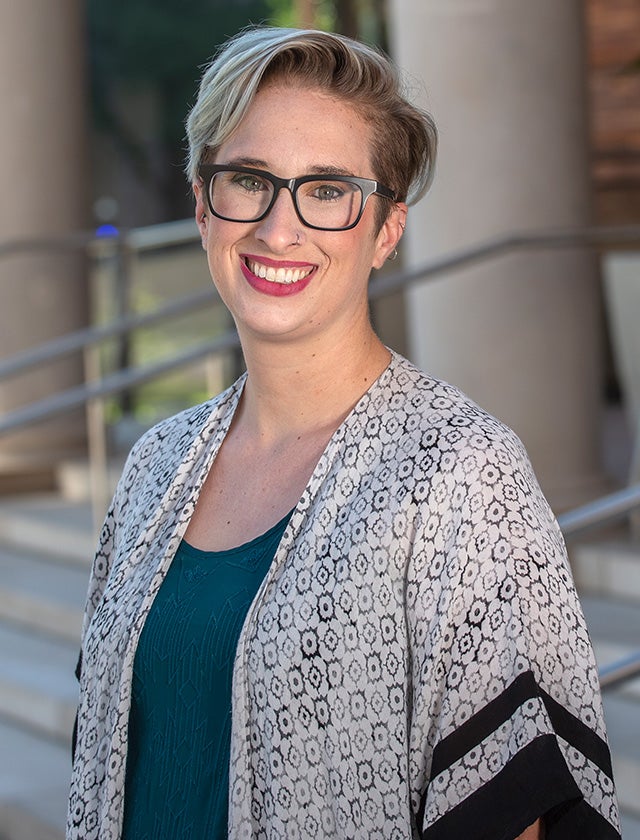
Subscribe to Pittwire Today
Get the most interesting and important stories from the University of Pittsburgh.Building bridges to connect people and research.
Hospital medical teams often confront this daunting, but common, problem: A medication is causing side effects, and they need to get the word out to patients. According to research, an effective way to communicate advice and information like this is through colorful brochures mailed to patients’ homes. But what if the brochures don’t get mailed, and patients who might be suffering don’t receive the vital information? In that case, a gap exists between the preferred solution and its execution in the real world.
And that gap needs a bridge.
That’s where implementation science methodologists like LauraEllen Ashcraft step in. Implementation scientists are bridge builders, using researched strategies to pinpoint the best way to usher innovations or practices into reality. Ashcraft identifies proven strategies that might help, asking questions like: In which parts of the process are we most likely to get tripped up? How can we track data and advise other hospitals?
Ashcraft (SOC WK ’13G, ’21G) works for the Veterans Affairs Medical Center in Philadelphia’s Center for Health Equity Research and Promotion as well as the Division of General Internal Medicine at the University of Pennsylvania. She helps develop programs like the brochure project, which is rolling out across nine medical centers in Pennsylvania and parts of Delaware and West Virginia, potentially affecting thousands of people. That’s what most excites her about implementation science.
“It’s fulfilling to help researchers get their interventions into practice, to make life better for Veterans,” she says.
Ashcraft did not expect to work in the medical field. She earned her degree in social work at Millersville University, near her hometown of Lancaster, Pennsylvania, and worked at a center for adults with serious mental illness. Although she loved it, the work felt draining.
Later, she joined the Lancaster County Coalition to End Homelessness, working alongside local nonprofits and businesses. Through this experience, Ashcraft learned she could affect change on a larger scale without depleting her emotional energy. She sought a graduate program to implement her career change and found Pitt’s School of Social Work, with its option to focus on social action, seemed like a good fit. She relocated to Pittsburgh and earned a master’s degree with concentrations in community organizing and social administration.
But her path soon took another unexpected turn when, on a whim, she accepted a medical research coordinator position. There, she got a taste of scientific research. Her group studied 10 telemedicine programs to investigate why they statistically only work well half of the time. The group gathered data, including 222 interviews with nurses and doctors, and wrote an article detailing their findings. Published in the American Journal for Respiratory and Critical Care Medicine, the paper has been downloaded nearly 3,400 times.
Galvanized by the power of research to influence outcomes, Ashcraft decided to pursue the burgeoning field of implementation science and stay in the city of bridges for a PhD. In 2019, she was the first Pitt Social Work student to win the Clinical and Translational Science Predoctoral Fellowship (TL1), a research training program funded by the National Institutes of Health that is typically awarded to students in the hard sciences. She gained mentorship from specialists in multiple disciplines — including pharmacy and computer science — for research on managing chronic pain. She also discovered other implementation scientists on campus and realized they were learning the same theories while siloed in various departments. So in partnership with Shari Rogal, a Pitt professor of medicine and surgery, Ashcraft founded the Pittsburgh Dissemination and Implementation Science Collaborative (DISC) as a communal space to learn and share.
“LauraEllen’s passion and dedication to social justice really helped shape the group,” says Rogal.
Through DISC, which currently boasts more than 150 members, scholars come together to host Zoom talks with implementation science experts, discuss publications and get feedback on research. The group also creates YouTube videos explaining implementation science and breaking down the jargon.
“At first, implementation science felt like such a black box,” Ashcraft says. “I didn’t want anyone else to feel like it was insurmountable.”
It’s one of the ways Ashcraft continues to learn while helping researchers execute the solutions that can make life better.
— Liberty Ferda, photography by Mike Drazdzinski



